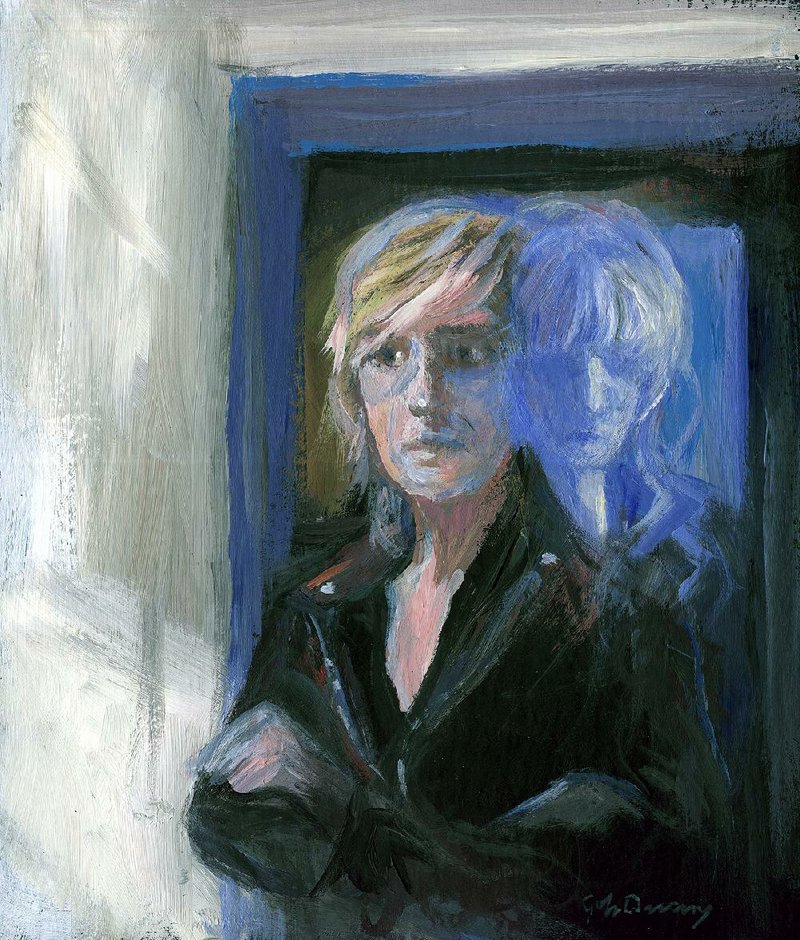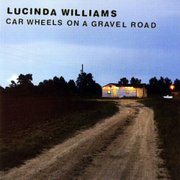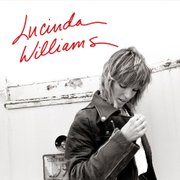One of the ways we begin to talk about terrible things is to set them to music.
Because putting them to music puts them at a remove, allows you to become -- or pretend to become -- someone else. Someone braver and bolder and less neurotic and cowed by shame than you otherwise are.
Lucinda Williams
Two Arkansas concerts
• 6 p.m. Thursday, Center for Humanities and the Arts Theatre, University of Arkansas — Pulaski Tech, 3000 W. Scenic Drive, North Little Rock
Tickets: $125-$175, Metrotix.com or (800) 293-5949. All tickets include preconcert reception with appetizers and drinks beginning at 6 p.m. in the lobby. Doors open at 7:30; concert will begin at 8. A portion of the ticket price will be tax-deductible donation to the nonprofit Oxford American magazine.
Sponsors: Ben E. Keith Foods Mid-South Division, Four Roses Bourbon, Lost Forty Brewing, Dust Bowl Lanes & Lounge, Fassler Hall, and Bill & Sally Rector.
• 7:30 p.m. Friday, The Auditorium, Eureka Springs
Tickets and info: $35-$45. (888) 695-0888, tix.extremetix.com/…
If you listen to Lucinda Williams, you will hear her sing of terrible things -- of suicide and doomed boys and 3 o'clock drinkers. Of loneliness and longing. Of bereftness. Of all the inevitable things we push from our minds in our ordinary moments but nevertheless shadow our sojourn in the world and make it precious, make it sweet.
Williams has some deep connections to Arkansas. Her father was the poet Miller Williams, who -- among myriad other things -- founded the University of Arkansas Press (and, I am compelled to mention, was a friend who edited and published two of my books). She was born in Lake Charles, La., and grew up in Vicksburg and Jackson, Miss.; Baton Rouge; Atlanta and Macon, Ga.; Santiago, Chile; and New Orleans. In the 1970s, she dropped out of the University of Arkansas, Fayetteville and began the career of an itinerant musician, playing in bars and coffeehouses in Austin, Texas; Nashville, Tenn.; Houston; and Greenwich Village.
For a while, she called herself simply "Lucinda" and sang Howlin' Wolf. Her first album, Rambling, was released by Smithsonian Folkways in 1979; it's pretty much straight roots music (more blues and country than folk, but you could hear the skeins twisting around each other) and pretty much gorgeous. She got $250 to record it.
Then she made another record for Folkways called Happy Woman Blues and wrote all the songs on it. She got $500 for that.
She spent a few years in Los Angeles in the early 1980s, hanging out at the Palomino Club. In the just-released book Woman Walk the Line: How the Women in Country Music Changed Our Lives (University of Texas Press, $24.95), songwriter Lady Goodman sketches Williams:
"She was the girl at the bar. Lanky, blonde, big eyes that drank everything up: she had a will to know and understand all the things that went on around her. Always a little sad underneath the kindness, always asking how you were and really meaning it, she had a voice that sounded a bit like a crow gargling kerosene in a raw wind -- and somehow it soothed you rather than set you on edge."
Williams is back in Arkansas this week, with a show at the University of Arkansas -- Pulaski Tech in North Little Rock to benefit the nonprofit Oxford American magazine on Thursday and another at the Eureka Springs Folk Festival on Friday. She's highly recommended. She's good at helping one forget oneself. She's got a really good, tight band.
And a new -- sort of new, anyway -- record.
Records don't really matter much anymore, but she and her band will probably play most of it in these shows, so it's appropriate to bring it up.
It's called This Sweet Old World, and it's a revisitation of her 1992 album Sweet Old World, a record that has been important to me since the week it was released. There have been weeks in the last 25 years when I haven't played the album but not that many.
It was not the first Lucinda Williams record I'd ever heard -- I had been astounded by her 1988 record called Lucinda Williams, widely known as the "white album" or the "Rough Trade" album after the British punk label that released it. Sometimes I think this album is still her best work because it was a kind of wised-up Southern soul sung by a woman of obvious intelligence who seemed indifferent to the commercial possibilities of country-rock. It didn't leave much of a mark on the collective consciousness, but it impressed a lot of critics and music industry types.
After Rough Trade folded, Williams found herself a semi-hot free agent. Major labels were interested, and she signed with RCA because its then president Bob Buziak was more on the music side than the money side of the business. But Buziak didn't last, and when he left most of RCA's cool kids went with him. So Williams was stuck for a while with a label that wanted her to be America's country sweetheart. She didn't like the sugary radio-ready mixes of her songs the company presented her with.
Miller Williams, her poet father, proudly told me the story several times:
"She was in a board room with all these record company executives, telling her how much they like the album, but she wouldn't budge. And one of them stood up and said, 'Young lady, this is RCA records. No one has ever walked away from an RCA records contract.'
"And Lu stood up and looked that man in the eye. She said, 'Well, I guess you can't say that anymore.' And walked out on Elvis Presley's old label."
The upshot was that her next album, the original Sweet Old World, didn't come out until 1992. And maybe four years doesn't seem like such a long time, but in those days, in that world, it was long enough for whatever momentum Lucinda Williams had provided her to fade away. I had just about given up on hearing any new Lucinda Williams music when Sweet Old World appeared in August 1992.
I was in a period of transition then, living in Phoenix but spending most of my weekends in Los Angeles. I had thrown myself into an intensive job. I was lonely. Sweet Old World arrived like a letter from home; within a few days I had memorized the record. Then I found out she was Miller Williams' daughter.
I don't know why I imagine the album opener "Six Blocks Away" to be set in Austin -- it could be anywhere with numbered streets, where a Third crosses a 10th. (Which doesn't occur in Austin, does it?) Anyway Benmont Tench's organ moans and Gurl Morlix's guitars snap, and Williams spins out a couple of easy verses about an unrequited longing that might resonate with anyone who has ever been proximate to someone indifferent to their ardor.
That was followed by "Something About What Happens When We Talk," a grown-up, clear-eyed song about a platonic relationship that's going to remain that way; "He Never Got Enough Love," in which empathy for a kid gone wrong is mustered; the remarkable title track "Sweet Old World" which falls like a benediction before the tender "Little Angel, Little Brother" and the devastating "Pineola," a soul-scraping recounting of the 1978 suicide of poet Frank Stanford that captures in plain language the futility of grief:
I could not speak a single word/No tears streamed down my face/I just sat there on the living room couch/Starin' off into space.
The second half of the record begins with the sexy, playful "Lines Around Your Eyes," and doubles down with "Prove My Love." Then she's back on the streets with the journalistically observed "Sidewalks of the City" and "Memphis Pearl" before blowing it out with the lusty "Hot Blood," her upper register quivering. Finally, she sends us home with a wistful, delicate cover of Nick Drake's "Which Will."
It's 45 minutes and 30 seconds long. It's practically perfect.
...
But obviously artists see, hear and feel things we don't sometimes, and for whatever reason Williams decided she was dissatisfied with the original. She reportedly felt that Sweet Old World, coming between her critical breakthrough Lucinda Williams and the landmark Car Wheels on a Gravel Road (1998) didn't receive the attention it should have.
So, encouraged by her husband (and co-producer) Tom Overby, Williams and her band -- guitarist Stuart Mathis, bassist David Sutton, and drummer Butch Norton, with longtime collaborator Greg Liesz also contributing some guitar -- recut the songs on Sweet Old World for the new release This Sweet Old World. (I consider T Bone Burnett's Proof Through the Night one of the greatest rock albums ever; Burnett can't stand the reverb and has attempted to re-record it several times. Listening to it today, I'll admit that it does sound like an early '80s album, but I stand by my judgment.)
While I'm not convinced it's a better record, This Sweet Old World does recast most of the material in interesting ways. A British-sounding electric 12-string now propels the opening track; "He Never Got Enough Love" has been fitted with new lyrics and its original title "Drivin' Down a Dead End Street" restored (Williams changed it in 1992 in deference to Bob Dylan's cover of Hank Snow's "90 Miles an Hour (Down a Dead End Street)" that was released around the same time). The keyboards and fiddles that decorated the original album are gone, resulting in a rawer, tougher sound that serves Williams' voice -- which has darkened and taken on a snarly, bluesy character over the years -- well.
The tracks have been re-ordered as well. "Prove My Love" has been moved up to second in the lineup and "Memphis Pearl" to fourth. "Pineola" is now the eighth track rather than the sixth. And the original versions clock in about 12 minutes shorter than the recut versions.
There are also four excellent bonus tracks included on the new release: "Factory Blues," "Dark Side of Life" which was originally recorded for the 1988 compilation, A Town South of Bakersfield Vol. 2, John Anderson's "Wild and Blue," and "What You Don't Know," a John Leventhal-Jim Lauderdale song recorded during the original Sweet Old World sessions.
I've lived with the original Sweet Old World for 25 years and can't throw it over for this new version. But "Drivin' Down a Dead End Street" is an improvement over "He Never Got Enough Love," and the new version of "Pineola" comes very close to matching the indelible original recording. And I might like the new version of "Hot Blood" a little better -- if only for Williams' new reading of "casserole."
Email:
blooddirtangels.com
Style on 10/29/2017





